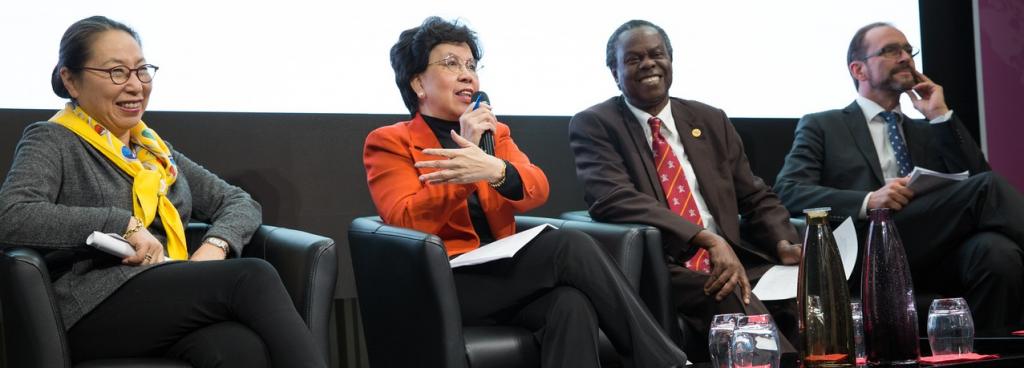“The [SDG] agenda is ambitious. It seeks nothing less than to transform the way the world works”. With these words and a call for think tanks and academic institutions to take up the challenge of SDG implementation, WHO Director-General Margaret Chan addressed the participants in the first ever Meeting of Global Health Policy Think Tanks and Academic Institutions, organised by the Global Health Programme on 12-13 November 2015. During these two days, public events, roundtables, and intersectoral sessions at the interface of health, trade, intellectual property, and security, allowed for an unprecedented exchange of ideas, experiences, and knowledge on the contributions that think tanks and academic institutions can make in proposing policies that could affect change, and in being critical partners who question approaches and address issues of transparency and accountability in SDG implementation.
If the role and influence of think tanks in the complex global health landscape is still open to debate, there was agreement that “the game has changed”. The transformational SDG agenda has indeed led to major shifts in global health governance, with important implications for SDG implementation and monitoring. The principle of inclusiveness has, at the global level, reshaped the relationship between the “Global North” and the “Global South”. This di-vision was challenged by both think tanks from the North and institutions from the South. Not only the multiple facets of the “Global South” were pointed out, but the idea of turning the world on its head was also put forward: speaking of South-North instead of North-South would account for the fact that the North should be learning from the South, where major challenges and innovation to address them can be found. Inclusiveness also has implications for civil society and new players in global health governance. The space is now open for think tanks and academic institutions to enter the game, but major questions on access to decision-makers and multilateral fora are yet to be answered, as the ongoing negotiations on the WHO framework for engagement with non-state actors testifies. Think tanks, therefore, need to undertake a first move out from their “tank” to reach out to a new set of actors at the local, regional, and global levels.
The second major “game change” of the SDGs is the focus on implementation, because “action alone leads to change”, as Pascal Strupler, Director-General of the Federal Office of Public Health of Switzerland and State Secretary for Health, reminded. Setting priorities at the country level and avoiding over-simplification and reductionism will be major challenges. Think tanks have a role to play in providing the evidence base for priority setting, and championing and monitoring goals and targets that address structural issues. In this regard, the meeting provided some food for thought on the role of think tanks in policy processes at the national level. It was in particular argued that think tanks should inform policy debates and the public, and promote long-term thinking – “inform and inspire”, with the words of Francis Omaswa, Executive Director of the African Centre for Global Health and Social Transformation. However, these considerations need to be put into perspective with the daily reality of think tanks, as they often rely on funding that is dependent on their proven impact on policy processes. Moreover, the issue of relevance was raised, with some participants suggesting that a gap may exist between the evidence provided by think tanks and the forms of evidence required by policy makers for informed decisions. Think tanks, therefore, also need to undertake an intellectual move out of their “tank” to be innovative in their strategies and in proposing new approaches and solutions.
A third key dimension in the SDGs is the interdependence across sectors. As Luiz Loures, Assistant Secretary-General of the UN and Deputy Executive Director of Programme of UNAIDS, highlighted, “the solution to global health challenges is outside of the health sector”. This is why International Geneva, with its proliferation of organisations in the fields of global health, trade, human rights, the environment and sustainable development, needs to play a role in building multistakeholder and multisectoral synergies in the implementation of the SDGs. In the same way, think tanks need to be multidisciplinary and develop partnerships across sectors, undertaking a final move out of their disciplinary “tank”.
The paragraphs above illustrate only a fraction of the discussions and challenges raised at the two-day meeting. Capacity building of think tanks, including training and engagement with the young generation, will be crucial to address all these issues. It is also clear that the efforts of think tanks to “think outside of the tank” can only be successful if matched by a similar movement on the part of other global health actors and decision-makers. In spite of these challenges, the meeting was successful in launching the debate and bridging think tanks and academic institution leaders with health- and health-related organisations based in Geneva. It also set the basis for the creation of an international network of global health policy think tanks. This network will not only allow for the exchange of experiences and expertise throughout the SDG implementation phase, but also for a more active engagement in global health processes, including at the next World Health Assembly. Stronger think tank voices are, therefore, to be expected in the implementation of health-related SDGs at all levels.


